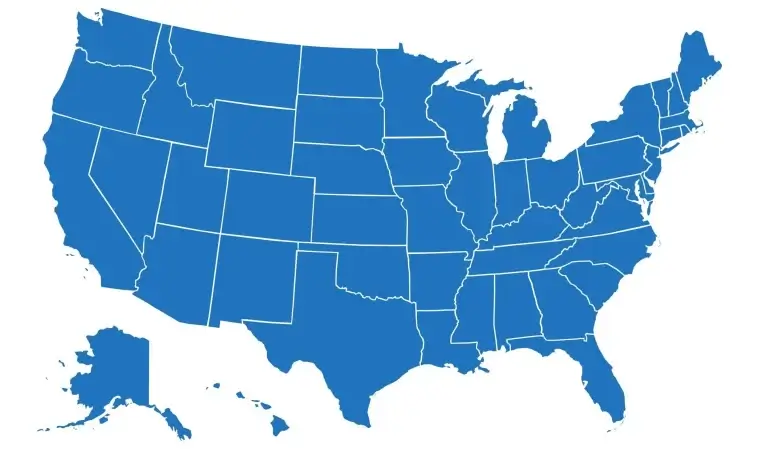Find Accredited MLIS Degree Programs Near You
Find schools for online MLS and MLIS programs near you
When pursuing a Master’s in Library Science (MLS) or Master’s in Library and Information Science (MLIS), location plays an important role—even if you’re considering an online program. From tuition savings to internship opportunities and state-specific certifications, where your school is located can significantly impact your education and career prospects. Whether you’re searching for an in-state option or considering out-of-state schools, this guide will help you weigh the geographic factors that matter when choosing the best program.
Begin your search by exploring schools in your state and beyond. Use our State-by-State Guide to MLIS Programs to compare options and find schools aligned with your goals.

Find Master's in Library Science Programs by State

- AL Alabama
- AK Alaska
- AZ Arizona
- AR Arkansas
- CA California
- CO Colorado
- CT Connecticut
- DE Delaware
- FL Florida
- GA Georgia
- HI Hawaii
- ID Idaho
- IL Illinois
- IN Indiana
- IA Iowa
- KS Kansas
- KY Kentucky
- LA Louisiana
- ME Maine
- MD Maryland
- MA Massachusetts
- MI Michigan
- MN Minnesota
- MS Mississippi
- MO Missouri
- MT Montana
- NE Nebraska
- NV Nevada
- NH New Hampshire
- NJ New Jersey
- NM New Mexico
- NY New York
- NC North Carolina
- ND North Dakota
- OH Ohio
- OK Oklahoma
- OR Oregon
- PA Pennsylvania
- RI Rhode Island
- SC South Carolina
- SD South Dakota
- TN Tennessee
- TX Texas
- UT Utah
- VT Vermont
- VA Virginia
- WA Washington
- WV West Virginia
- WI Wisconsin
- WY Wyoming
Why Location Matters for MLS and MLIS Degrees
The geographic location of your MLS or MLIS program is more than just a logistical consideration—it directly impacts your education, costs, and career opportunities. Whether you’re pursuing an online or in-person program, choosing the right location can influence everything from tuition rates to professional networking. Below, we explore the key factors that make location a critical component of your decision.
Tuition and Financial Aid
One of the most significant advantages of choosing an in-state program is the potential for lower tuition costs. Many public universities offer reduced rates for residents, allowing you to save thousands of dollars over the duration of your degree. For example, in-state tuition for an MLS or MLIS program can cost half or even a third of out-of-state rates. Some states also offer regional tuition reciprocity agreements, allowing students from neighboring states to benefit from reduced tuition costs without relocating.
Additionally, in-state programs often make you eligible for state-specific scholarships or grants, further easing the financial burden of graduate education. These cost savings can be especially important for students pursuing full-time programs or those balancing part-time work alongside their studies.
Internship and Networking Opportunities
Proximity to libraries, museums, archives, and cultural institutions plays a crucial role in shaping your professional experience. Many MLS and MLIS programs have established partnerships with local organizations to provide hands-on learning opportunities, internships, and fieldwork. Being close to these institutions allows you to build meaningful connections, gain practical experience, and potentially secure post-graduate employment.
For example, students attending schools in metropolitan areas like New York, Washington D.C., or Los Angeles may have access to prestigious institutions such as the New York Public Library, the Library of Congress, or prominent corporate archives. Similarly, rural or regional universities often maintain strong connections with local public libraries and school districts, offering unique opportunities to engage with underserved communities.
State-Specific Licensing or Certification
For aspiring school or public librarians, location is particularly important due to state-specific certification requirements. Many states mandate that candidates complete accredited programs aligned with local standards for licensing. By choosing a program in your home state, you can ensure that your coursework meets these requirements, simplifying the certification process.
For example, California requires a valid teaching credential and completion of a Teacher Librarian Services Credential program, while New York offers conditional certification for candidates earning their MLS. Out-of-state programs may require additional steps to transfer certification eligibility, which can complicate the process.
Job Placement and Alumni Connections
Attending a program in the region where you plan to work enhances your access to local job markets. Schools often maintain strong alumni networks and relationships with local employers, making it easier to secure employment after graduation. For instance, attending a university in the Midwest may provide direct connections to libraries, archives, and cultural institutions throughout the region, while studying on the West Coast might open doors to tech-driven library and information science roles.
Alumni networks are invaluable for mentorship, job referrals, and professional growth. Many schools host alumni events, job fairs, and networking opportunities specific to their region, ensuring that you stay connected to local industry professionals.
Program Specializations
Location also plays a role in the availability of unique program specializations. Some universities are known for their expertise in niche areas of library and information science. For instance:
- Digital Libraries: Programs in tech-centric regions may emphasize digital innovation, metadata, and user experience design.
- Cultural Heritage Preservation: Schools near historical or cultural hubs often excel in this specialization, providing access to archives, museums, and heritage institutions.
- Law Librarianship: Universities located near major legal centers may offer targeted programs and internships with law firms, courthouses, and legal libraries.
Choosing a school with strong faculty expertise and resources in your desired specialization can give you a competitive edge in the job market.
Whether you’re pursuing an in-state or out-of-state MLS or MLIS program, location will shape your graduate experience in tangible ways. By considering tuition, networking, certification requirements, job placement, and specializations, you can make an informed decision that aligns with your academic goals and career aspirations.
In-State vs. Out-of-State MLS and MLIS Programs
In-State Schools: Affordable and Convenient
Choosing an in-state program can be a cost-effective way to earn your MLS or MLIS degree. Public universities often provide discounted tuition for residents, reducing the financial burden of graduate education. Additionally, in-state schools typically maintain strong ties to local libraries, museums, and archives, making it easier to secure internships or field placements in your area.
Studying in-state is especially beneficial if you plan to work locally after graduation, as the curriculum is often tailored to meet state-specific certification requirements for roles like School Librarian or Public Librarian. This alignment can save time and effort when pursuing state licensure.
Out-of-State Schools: Access to Specialized Programs
For students seeking a specific specialization or a prestigious program, out-of-state schools offer compelling opportunities. For instance, if you’re interested in Law Librarianship or Digital Library Science, certain universities may be known for their expertise in those areas, making the higher out-of-state tuition worthwhile.
Even in online programs, out-of-state schools can provide valuable networking opportunities, including connections with professors, alumni, and peers from across the country. However, students considering out-of-state programs should research how internships and field experiences will be facilitated locally if they’re studying remotely.

